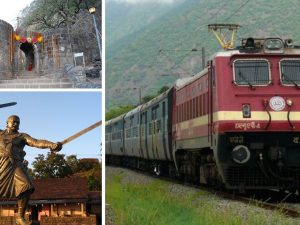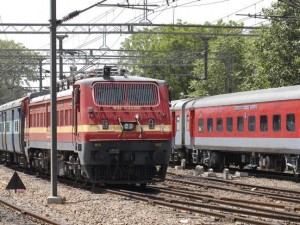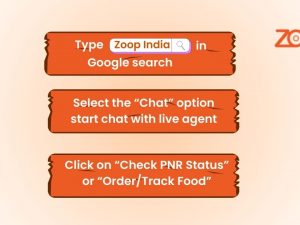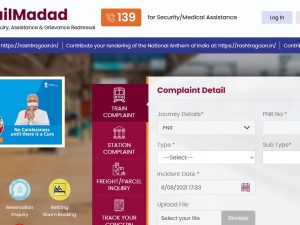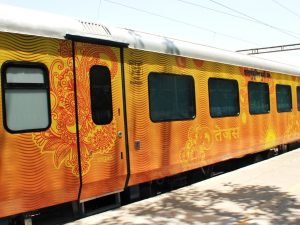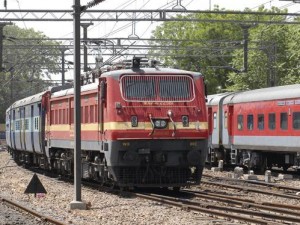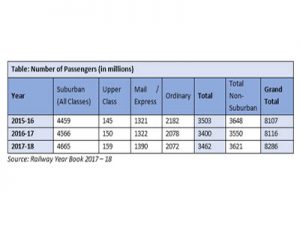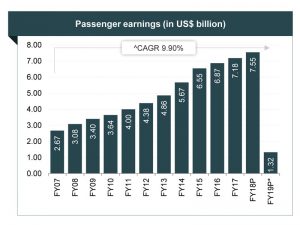Indian Railways will launch a special tourism initiative — the Chhatrapati Shivaji Maharaj and Glorious Maratha Tourism Train — offering travellers a six-day heritage journey through Maharashtra’s legendary Maratha forts and temples. The train blends history, culture, and spirituality and will depart from CSMT, with boarding available at Dadar and Thane.
Read More »Railways Revs Up Tourism with Mumbai-Indore Train
Giving tourism and trade a major upswing, the Indian government has approved a new railway line connecting Mumbai and Indore. This 309 km route will be the shortest rail link between the two commercial hubs, reducing travel time significantly. The project, estimated to cost Rs. 18,036 crores, is expected to be completed by 2028-29. This new rail connection will not only enhance connectivity but also promote tourism in the region, especially to the popular religious sites of Ujjain and Indore.
Read More »IRCTC’s Zoop can be used for food delivery on trains: Indian Railways
IRCTC announced the launch of Zoop, a Google Chatbot for food delivery on trains. Railway passengers can simply google “Zoop India” and click on the “Chat” option for ordering food on train, track their PNR status, and orders within the chat itself. From checking the PNR Status on Google Chats to selecting their desired items to track their orders, users can carry out the entire process without the app or website can be done with AI assistance. The entire food ordering process is very smooth and user-friendly. Here’s how to use the Zoop Google Chat for Indian Railways: 1. Type “Zoop India” on the Google search bar 2. Select the “Chat” option – this will open a pop-up for chat with a live agent 3. Select “Check PNR Status” or “Order Food” as per your needs. Puneet Sharma, Founder, Zoop, comments “Our goal is to provide our customers with quality meals from a wide variety of options, including full-course meals, snacks, and drinks. Upon ordering, passengers can track the progress of their orders in real-time”. He commented that Zoop not only offers convenience but also flexibility, as travelers can choose to order anything from a light snack to a full meal. With the introduction of Google chatbot, passengers don’t have to choose between pantry car snacks or waiting until getting off the train to get a good meal.
Read More »Railways merges helplines, launches RailMadad
Indian Railways has launched RailMadad, a one-stop solution for customer grievance, enquiry, suggestion and assistance, providing passengers access through website, App, SMS, social media and helpline number 139. A number of helplines that earlier existed in the Railways for various purposes have been merged into this, and will be available round the clock in 12 languages.
Read More »Niti Aayog moots Rs. 22,500-crore plan for 150 private trains on 100 routes
Niti Aayog and the Indian Railways have come out with a discussion paper for running 150 trains on 100 routes by private operators, envisaging an investment of ₹ 22,500 crore. The discussion paper titled ‘Private Participation: Passenger Trains’ has identified 100 routes, including Mumbai Central-New Delhi, New Delhi- Patna, Allahabad-Pune and Dadar-Vadodara. Other prominent routes include Howrah-Chennai, Howrah Patna, Indore-Okhla, Lucknow-Jammu Tawi, Chennai-Okhla, Anand Vihar-Bhagalpur, Secunderabad-Guwahati and Howrah-Anand Vihar. The paper, prepared for discussions with stakeholders, has split the 100 routes into 10-12 clusters. The plan is to move in swiftly with the panel headed by NITI Aayog CEO Amitabh Kant suggesting that the first train can be rolled out within six months of the award, with 35-year contracts to be awarded to entities offering to pay the highest revenue share. As per the paper, the private operator will have the right to collect market-linked fares and will be provided flexibility of class composition and halts. The privatisation of train operation, the paper said, will help in introducing modern technology and rolling stocks with reduced maintenance. Besides, it would provide world-class service experience to passengers and also help in reducing the supply demand deficit. The operators could be domestic or international entities, the paper said. Each bidder would eligible for award of maximum three clusters, it added.
Read More »Rail fares hiked; up by 1-2 paise/km for non-AC and 4 paise/km for AC classes
Indian Railways has increased rail fares. The last fare revision over Indian Railways was done in 2014-15. For the passengers travelling in ordinary non-AC classes, there shall be an increase of 1 paisa/PKM (Passenger Kilometer), and of 2 paise/PKM for non AC mail or express trains. For AC classes, the increase is 4 paise/PKM. The increase in fare will be on tickets bought on or after 1st January 2020 and no excess fare (difference of fare) will be charged from passengers who have booked tickets before 1st January 2020. In an official statement, the Ministry of Railways said “In order to expand passenger amenities and facilities at railway stations and trains, it has become imperative to increase the fare marginally without overburdening any class of passengers. Further, the burden of 7th Pay Commission on Indian Railway has necessitated rationalisation of fares. Fare revision will help in channelising the fast modernisation of Indian Railway. Keeping the affordability concerns of daily commuters, there shall be no fare hike for passengers over suburban sections and season ticket holders. This class constitutes 66% of total passenger segment over Indian Railways. Existing fares of train services like Rajdhani, Shatabdi, Duronto, Vande Bharat, Tejas, Humsafar, Mahamana, Gatiman, Antyodaya, Garib Rath, Jan Shatabdi, Rajya Rani, Yuva Expresses, Suvidha and special trains on special charges, AC MEMU (non-suburban), AC DEMU (non-suburban) etc shall similarly be revised to the extent of the above-proposed increase in class-wise fares.”
Read More »Bids invited from private sector to redevelop four railway stations
For the redevelopment of Nagpur, Gwalior, Amritsar and Sabarmati railway stations, the government has invited bids involving an investment of around Rs 1,300 crore. The redevelopment was a long-standing demand to spur private investment in the sector. This comes soon after the Indian Railways’ decision to prioritise development of 50 railway stations, drawing from the example of privatisation of six airports in the country. The Indian Railways Station Development Corporation has invited request for qualification (RFQ) for the redevelopment of these railway stations. The indicative station redevelopment cost for the four projects will be Rs 465 crore for Nagpur, Rs 300 crore for Gwalior, Rs 375 crore for Amritsar and Rs 156 crore for Sabarmati.
Read More »Indian Railways carried 170 million more passengers in 2017-18 than in 2016-17
According to statistics from the Railway Yearbook, the The Indian Railways has contributed immensely to the growth of tourism in India and is among the world’s fourth largest railway network. During 2017-18, the Indian Railways has carried 8,286 million passengers as against 8,116 million in 2016-17. In 2015-16, this figure was 8107 million.
Read More »Passenger earnings of Indian Railways increases at a CAGR of 10% in 2018
Revenues from the passenger segment of Indian Railways have increased at a CAGR of 9.90 per cent to US$ 7.55 billion in FY18 from US$ 2.67 billion in FY07, according to a Railways report by India Brand Equity Foundation (IBEF). Passenger earnings of Indian Railways stood at Rs 8,534.71 crore (US$ 1.32 billion) during April-May 2018. With eight metro rail networks spread over a length of 370 kilometres (km) and over two dozen metro projects lined up, India’s metro rail network is expanding at a fast pace.
Read More »Indian Railways asks passengers to report 15-20 minutes before departure
Indian Railways is planning to seal stations just like airports and passengers would be advised to arrive 15-20 minutes before scheduled departure of trains to complete the process of security check. Arun Kumar, Director General, RPF, told PTI, “The security plan has already been put in motion in Prayagraj, in anticipation of the Kumbh Mela, and at Hoobly railway station in Karnataka with a blueprint for 202 more stations ready for implementation. “The plan is to seal the stations. It is primarily about identifying openings and to determine how many can be closed. There are areas which will be closed through permanent boundary walls, others will be manned by RPF personnel and some will have collapsible gates.” He further added, “At each entry point, there will be random security checks. However, unlike at airports, passengers need not come hours in advance, but just 15-20 minutes ahead of their departure times to ensure that they are not delayed because of the security process.” Kumar said that while security will increase, presence of security personnel will not. “If we are inventing in technology, then manpower requirement will reduce,” he said. These steps are a part of a security plan under the Integrated Security System (ISS) which was approved in 2016 to strengthen surveillance mechanism at 202 railway stations. Source: PTI
Read More » Tourism Breaking News
Tourism Breaking News
